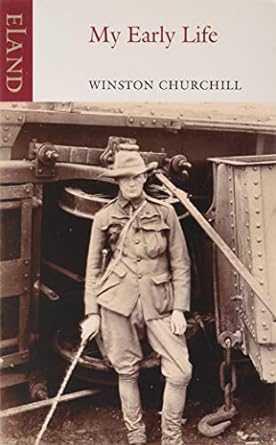My Early Life
By Winston Churchill
Summary

| Content | 7/10 |
| Readability | 9/10 |
| Presentation | 6/10 |
| Ideas | 8/10 |
| Value for money | 8/10 |
| Did it do what it said on the box? | 8/10 |
How do the rankings work?
The Review
A stirring, inspiring and very funny autobiography by Britain's greatest leader
What surprised me most about this book was the humour. I expected the familiar story of our greatest leader’s early life, I expected an insightful account of Britain in the late 19th and early 20th centuries, I expected a stirring tale of a young man who was a practical adventurer just as much as politician and author. I didn’t expect to laugh out loud regularly for much of the story.
If you’ve seen the film “Young Winston”, based on this book, you will be familiar with some of the events. Other programmes and books have adequately explained his war leadership and his contribution to many serious political issues. However, the films and documentaries I have seen fail to capture the mischievous spirit communicated through this book.
This a fascinating study of a bygone age, when Britain maintained a great empire, when most politicians took the title Lord, and when politics and army officership were sports for those of independent means. Interestingly despite his aristocratic bloodline Churchill’s family was not particularly wealthy and some of the most poignant lessons stem from this.
Sometimes the sentiments in the book appear bloodthirsty or imperialistic, but you have to realise that at least part of the time Churchill is writing satirically, reflecting common values which you suspect he did not always share himself. When he is sincerely expressing his own serious ideals it is usually easy to detect.
These beliefs link both his skilful analysis of historical events, and Churchill’s account of his own development. For example he explains the British government’s failure to be magnanimous after the early victories of the Boer war as the reason that a relatively fast-moving and honourable conflict descended into “shocking evils” on both sides. The same failing is shown as a prime force in the leftward drift of Churchill’s own politics.
Churchill was a great writer, but it’s instructive to learn that his facility with English developed largely because he was judged early on to be too dim to cope with Latin and Greek. The classics loss was our gain, the legacy including both Churchill’s great deeds and great writing.
The last chapter is slightly disappointing, with Churchill’s early parliamentary career an anticlimax, and the story stops rather than ending on a major event. That apart, the pace, interest and humour are consistent throughout.
This book was written in 1930, when Churchill was already 56, but in the “wilderness years” before he regained high office and led Britain through the Second World War. It is interesting to speculate whether the book would have been very different if it were written either much earlier or later.
If you want adventure, read this book. If you want to understand a great man, read this book. If you want to do both and have a good laugh, read this book.
Buy It From Amazon
Amazon.co.uk  |  | Amazon.com
|

 Thoughts on the World (Main Feed)
Thoughts on the World (Main Feed) Main feed (direct XML)
Main feed (direct XML)